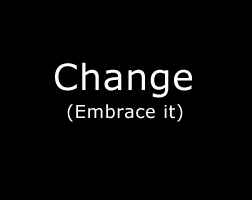Successful entrepreneurs must push themselves to develop a set of, often seemingly contradictory, business and life skills. We’ve already talked about fearless passion and not drinking your own bathwater.
Today, we’ll expand on a skill that is becoming ever more important in these times of rapid technological, social and business evolution — the need to embrace change. In my own life, it has been a personal hallmark, so much so that without major new challenges and course corrections, my life satisfaction drops precipitously. Therefore, seeing Guy Kawasaki’s recent interview with Ariane de Bonvoisin called Change is Good reminded me to add change into my personal Entrepeurial Toolkit as skill #3.
For me personally, it is wonderfully affirming that, what I used to consider a pathological need for change, is in fact highly adaptive for the future world. Ariane’s book defines ideal entrepreneurs as “chance optimists”, who believe change is mostly good. Furthermore, those who have a strong believe in the positive power of change can flex their “change muscle” to overcome adverse emotions, or “change demons.” I think you get the picture, but it is certainly well worth reading, if only to re-affirm how important change has become to building lasting value.
The notion that change is cool has long been a hallmark of the culture of Silicon Valley, and most technology startups. Entrepreneurial founders are naturally aggressively impatient, pursuing change with an ADHD-like intensity. In fact, one influential business school commentator, who will remain nameless, suggested that the management style favoured in the Silicon Valley, which is so tuned to rapid growth and a challenging environment, would totally fall apart in the more repetitive world of “traditional” business. The truth is that the technology startups of the 1980’s and 1990’s were almost certainly belwethers heralding the morphing of our economy into one that is largely knowledge-based. I’m really not so sure that a business built on repetition and “continuous improvement” (which, sadly, is often more like “death by a thousand cuts”) has much of a future. But, what is unquestionably true is that the change-intensive technology startup culture is miles apart from traditional businesses whose historical rate of change was measured in decades, not weeks or months.

 In a world full of change, do maturity and learned experience continue to have value? Absolutely. Serial entrepreneurs learn to “replay a tape” of past successes, and even more importantly, to avoid pitfalls that have bedevilled them in the past. However, replaying the tape is much more complicated as the pace of change accelerates. A good analogy is that you are replaying the tape as the format transitions through 8-Track, to Cassette,
In a world full of change, do maturity and learned experience continue to have value? Absolutely. Serial entrepreneurs learn to “replay a tape” of past successes, and even more importantly, to avoid pitfalls that have bedevilled them in the past. However, replaying the tape is much more complicated as the pace of change accelerates. A good analogy is that you are replaying the tape as the format transitions through 8-Track, to Cassette,  CD and now to MP3s in Flash memory, while the music genre morphed from Disco to Punk to Rap. Notwithstanding this, there are still enduring universal truths about making great music that transcend format or genre. The same is true for entrepreneurs building great businesses.
CD and now to MP3s in Flash memory, while the music genre morphed from Disco to Punk to Rap. Notwithstanding this, there are still enduring universal truths about making great music that transcend format or genre. The same is true for entrepreneurs building great businesses.
I mention this because I still have people ask me to talk about experiences in developing “go to market” strategies from 10 or even 15 years ago. While there are some valuable object lessons there, the approaches today (as we’ve discussed in other blog posts) are totally different. That being said, I feel that those earlier experiences have helped me to navigate this current change-infused world. Alas, my early world of physically shrinkwrapped software, sold through mail order distributors like Programmer’s Paradise and advertised in physical magazine ads, that built MKS in the 1980’s is largely history. The 1990’s saw most software sold via ecommerce on the web. Millenial startups leverage vast social networking platforms (Facebook, Twitter, etc.) and mobile distribution models. Like the tape analogy, each iteration of the market is pushing the envelope and, yet, each borrows heavily from existing playbooks as well.
Furthermore, even technology startups can get into a rut of repetition. As an entrepreneur, it is critical to have a network of intelligence that helps you navigate your ever changing business landscape.
 If you want to learn from first hand from Ariane de Bonvoisin on the subject of “Taking Charge of Change”, or even ask your own questions, sign up for her 21 August, 2008 Calliflower call by clicking here.
If you want to learn from first hand from Ariane de Bonvoisin on the subject of “Taking Charge of Change”, or even ask your own questions, sign up for her 21 August, 2008 Calliflower call by clicking here.
In summary, embrace change by being both a “change optimist” yourself and encouraging it in your team. My strong belief is that it will enhance your ultimate success as an entrepreneur, and also increase your personal satisfaction during your personal journey to success, however you define it.
28 Jun 2008
0 CommentsEntrepreneurial Toolkit #3: Embrace Change
Successful entrepreneurs must push themselves to develop a set of, often seemingly contradictory, business and life skills. We’ve already talked about fearless passion and not drinking your own bathwater.
Today, we’ll expand on a skill that is becoming ever more important in these times of rapid technological, social and business evolution — the need to embrace change. In my own life, it has been a personal hallmark, so much so that without major new challenges and course corrections, my life satisfaction drops precipitously. Therefore, seeing Guy Kawasaki’s recent interview with Ariane de Bonvoisin called Change is Good reminded me to add change into my personal Entrepeurial Toolkit as skill #3.
For me personally, it is wonderfully affirming that, what I used to consider a pathological need for change, is in fact highly adaptive for the future world. Ariane’s book defines ideal entrepreneurs as “chance optimists”, who believe change is mostly good. Furthermore, those who have a strong believe in the positive power of change can flex their “change muscle” to overcome adverse emotions, or “change demons.” I think you get the picture, but it is certainly well worth reading, if only to re-affirm how important change has become to building lasting value.
The notion that change is cool has long been a hallmark of the culture of Silicon Valley, and most technology startups. Entrepreneurial founders are naturally aggressively impatient, pursuing change with an ADHD-like intensity. In fact, one influential business school commentator, who will remain nameless, suggested that the management style favoured in the Silicon Valley, which is so tuned to rapid growth and a challenging environment, would totally fall apart in the more repetitive world of “traditional” business. The truth is that the technology startups of the 1980’s and 1990’s were almost certainly belwethers heralding the morphing of our economy into one that is largely knowledge-based. I’m really not so sure that a business built on repetition and “continuous improvement” (which, sadly, is often more like “death by a thousand cuts”) has much of a future. But, what is unquestionably true is that the change-intensive technology startup culture is miles apart from traditional businesses whose historical rate of change was measured in decades, not weeks or months.
I mention this because I still have people ask me to talk about experiences in developing “go to market” strategies from 10 or even 15 years ago. While there are some valuable object lessons there, the approaches today (as we’ve discussed in other blog posts) are totally different. That being said, I feel that those earlier experiences have helped me to navigate this current change-infused world. Alas, my early world of physically shrinkwrapped software, sold through mail order distributors like Programmer’s Paradise and advertised in physical magazine ads, that built MKS in the 1980’s is largely history. The 1990’s saw most software sold via ecommerce on the web. Millenial startups leverage vast social networking platforms (Facebook, Twitter, etc.) and mobile distribution models. Like the tape analogy, each iteration of the market is pushing the envelope and, yet, each borrows heavily from existing playbooks as well.
Furthermore, even technology startups can get into a rut of repetition. As an entrepreneur, it is critical to have a network of intelligence that helps you navigate your ever changing business landscape.
In summary, embrace change by being both a “change optimist” yourself and encouraging it in your team. My strong belief is that it will enhance your ultimate success as an entrepreneur, and also increase your personal satisfaction during your personal journey to success, however you define it.